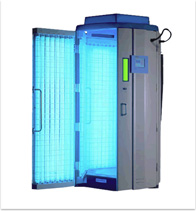SERVICES
- Allergy Screening
- Chemical Peels
- Dermapen
- Facial Skin Analysis
- FreshEyes
- Hyperhidrosis (Excessive Sweating)
- Hair Loss Treatment
- Laser Clinic
- Liquid Facelift
- Keloid Treatments
- Medical Facials
- Medical Treatments
- Mole Mapping
- Photodynamic Therapy (PDT)
- Skincare Advice
- Pigmentation Treatment
- Surgical Procedures
- Ultraviolet Phototherapy
USEFUL LINKS
 UVB (ultraviolet B light) is the most common form of phototherapy used to treat various skin diseases, including psoriasis, eczema, and itching. You will be exposed to this high-energy UV light for a varying length of time. This treatment is NOT A CURE, but can effectively control or improve your disease or the symptoms of your disease. Patients have used this treatment successfully for many years and often are able to maintain clearance of improved skin over extended periods of time.
UVB (ultraviolet B light) is the most common form of phototherapy used to treat various skin diseases, including psoriasis, eczema, and itching. You will be exposed to this high-energy UV light for a varying length of time. This treatment is NOT A CURE, but can effectively control or improve your disease or the symptoms of your disease. Patients have used this treatment successfully for many years and often are able to maintain clearance of improved skin over extended periods of time.
Each condition and patient will vary in the number of treatments needed per week and the time it will take to reach clearing. Most patients initially require 2 to 5 treatments each week to clear their lesions. Typically, treatments start with only a few seconds of light exposure and increase gradually as determined by the practice. It may take 15-25 treatments or longer to improve your disease or the symptoms of your disease. Not all patients will clear completely. Many patients go into remission and may then stop treatments.
The expected benefits of phototherapy are:
(1) Improvement of existing lesions;
(2) Reduction of new lesions;
(3) Remission — in many cases phototherapy has resulted in a near-total clearing of the disease process. The duration of this remission varies with each patient. Maintenance therapy may be required.
Risks and side-effects of phototherapy:
(1) The most common side-effect of this therapy is UVB-induced sunburn. This may occur at any time during therapy. Certain drugs may also cause you to get sun burned. Please let your doctor know of any medications you are taking, or any that you begin while undergoing therapy.
(2) It is possible with any form of UV light that an increased incidence of skin cancer may occur later in some patients, usually only with many UV light treatments.
(3) UV treatments may cause dryness and itching.
(4) UV treatments age the skin over time and may increase freckles and pigmentation of the skin.
(5) Ultraviolet rays may damage the eyes and increase your risk of cataracts. This is preventable with protective eye goggles worn during treatment. These will be given to you and are required for treatment.
(6) UV light may cause a flare of fever blisters and mouth sores in susceptible people.
(7) Long-term UV exposure to the unprotected genital area in men may cause an increase in genital cancer. Therefore all men will wear underwear while in the light box.
(8) UV light may cause exacerbation of other medical conditions such as lupus erythematosus which have a sensitivity to UV wavelength.
Patient Testimonials
EXCELLENTTrustindex verifies that the original source of the review is Google. From my first visit with Dr Jhetam I knew I would go back. He is compassionate , friendly and has an interaction which made you feel comfortable. This is very important in any doctor because our relationship with our doctor is very intimate.Trustindex verifies that the original source of the review is Google. Dr Jhetman is truly one of a kind. Anyone who is fortunate enough to be in his care can so grateful. Academic, informative and reassuring. It’s hard to find a doctor who has this combination of skills these days. He dealt with my Melonoma concerns with swift and professional care. And his staff are equally as competent and caring. I cannot commend Dr Jhetman and his staff enough on true patient care. Thank you!Trustindex verifies that the original source of the review is Google. I was absolutely satisfied with my experience with Dr Jhetham & his winning team. Keep up the good work.Trustindex verifies that the original source of the review is Google. Best skin doctor..Dr Jetham prescribed the best products that have brought so much of a glow to my skin..being a transplant patient and so much happening to my skin just 4 visits to him and my face is back to it's radiance ..I hightly reccomend Dr Jetham ...you won't go wrong..Trustindex verifies that the original source of the review is Google. Dr. Imraan Jhetam and his team provided exceptional care, showcasing professionalism and compassion in every interaction. Dr. Jhetam took the time to thoroughly explain everything, addressing each of my concerns with empathy and understanding. My experience with him was truly wonderful, and I highly appreciate his dedication to patient care.Verified by TrustindexTrustindex verified badge is the Universal Symbol of Trust. Only the greatest companies can get the verified badge who has a review score above 4.5, based on customer reviews over the past 12 months. Read more



